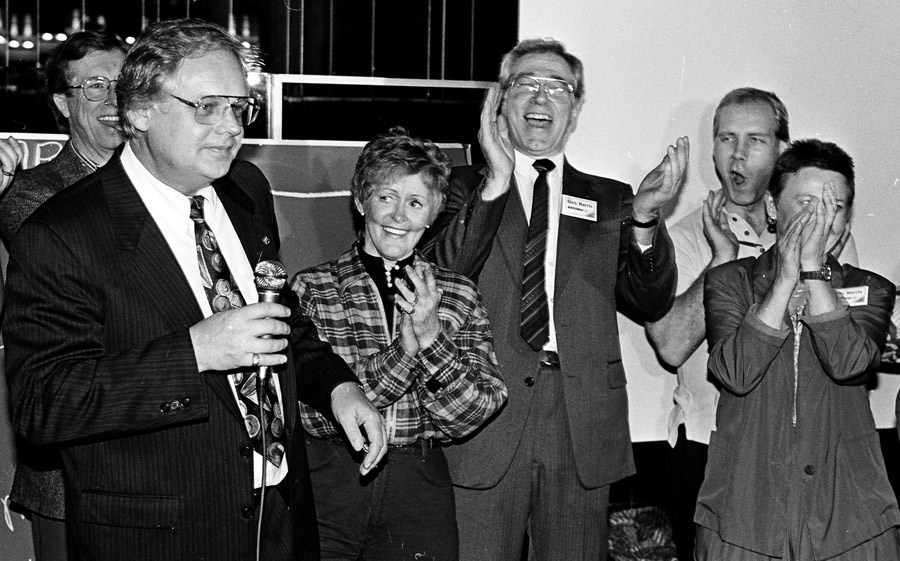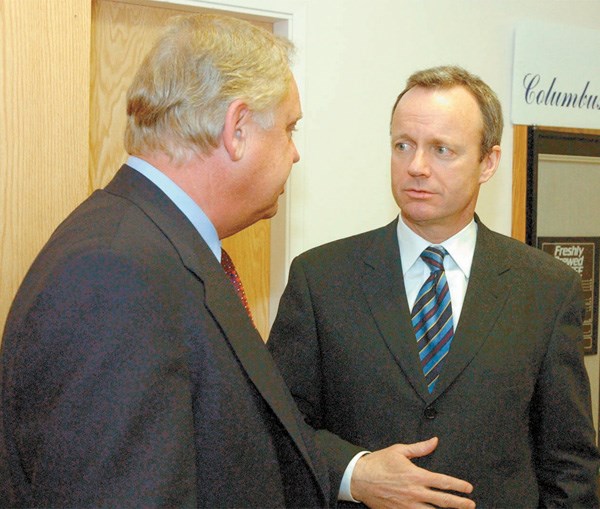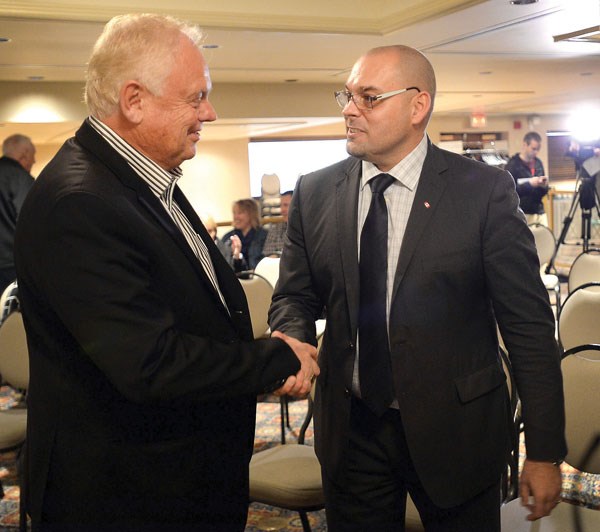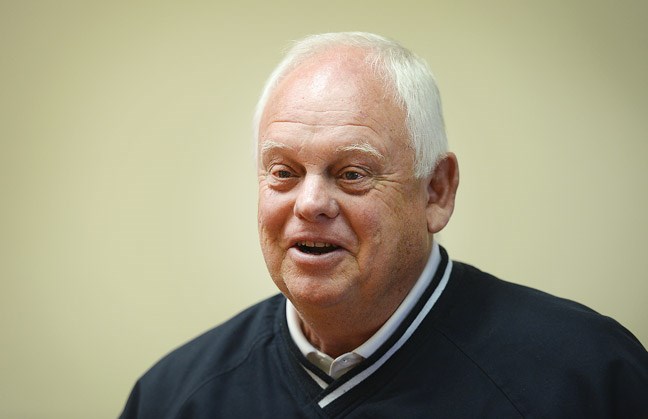When former prime minister Stephen Harper visited Gov. Gen. David Johnston on Aug. 2 with a request to dissolve Parliament, Cariboo-Prince George MP Dick Harris was out of a job.
And for the first time since 1993, he had no intention of trying to get it back.
Publicly, the 71-year-old brushed off claims of his retirement until as late as May 2014 and didn't make the official announcement until last October when he endorsed eventual successor Todd Doherty.
But Harris admitted the decision to step down was actually made before the writ was dropped for the 2011 contest.
With a feeling that a majority government was coming the Conservative Party's way, Harris said he and his wife Anne Phillips made the decision to go one last time since there would be a four-year set window.
So why the subterfuge?
"Well, it was fun to do that," Harris said, sitting down for a wide-ranging, two-hour interview with The Citizen at the end of October.
Granted, it wasn't a well-kept secret, but as long as Harris himself never confirmed it publicly, the idea that he would run again could keep going.
Harris said it also shone a brighter spotlight on prospective candidates for the Conservative Cariboo-Prince George nomination, though arguably that race was going to be high-profile whether Harris announced his retirement in 2014 or 2012.
The area has long been a right-wing stronghold, and anyone holding the nomination would be seen as having a fairly smooth path to Ottawa.
As it now exists, the riding was first established in 2004, created from parts of the now-defunct Prince George-Bulkley Valley and Cariboo-Chilcotin districts.
Both ridings were dominated by right-wing representation from 1979 until 2004, with the exception of the four years that the NDP's Brian Gardiner took over in Prince George-Bulkley Valley between 1988 and 1993.
Harris, running as a Reform candidate, beat the incumbent in 1993 with 40 per cent of the vote to Gardiner's 23 per cent.
But working as an elected federal official wasn't something Harris set out to do, though the Prince Rupert-raised businessman was generally politically active.
"It happened actually sort of as a surprise," said Harris.
By the late 1980s, Harris said he had become disillusioned with the Progressive Conservatives and was swayed by the 'West wants in' mantra peddled by Preston Manning and the Reform Party.
By the spring of 1992, Harris was president of the newly formed Prince George-Bulkley Valley Reform Party riding association, which boasted approximately 2,000 paid members in anticipation of the 1993 contest.
Those membership numbers were unheard of at the time, according to Harris, and it was due to an aggressive pitch of the Reform Party's message of change, responsible government and law and order.
"We were everywhere with our message – and I mean everywhere," said Harris. "If there was a cow having a calf and there was more than one person there, we were there handing a brochure out."
It was that same spring that some prominent party members took Harris to lunch at Rosel's Restaurant and asked him about the chances of winning in a general election for those running for the Reform nomination. When Harris didn't express full confidence in their odds, the conversation turned to his chances.
"I said, 'Okay, can I think it over at least?' He said 'Yeah, we'll have lunch tomorrow. You let us know,'" said Harris.
"So that was how it started. I said yes, we set about and we won the first election and then the next six."
According to Harris, he and his staff worked on about 20,000 files over his nearly two-dozen years in federal office.
"And people want to know why we got elected seven times? That's the reason," said Harris.
"Because those are the people that tell their friends that you helped them or you were willing to help. Whether it was a successful conclusion or not, you made the effort to try and help them."

'Dance with the one who brought you'
There's a story Dick Harris likes to tell to illustrate what he saw as the crux of his job for the past 22 years.
It involves sitting down for a cup of coffee shortly after being elected as the MP for Prince George-Bulkley Valley in 1993 and hearing a tale of woe from a constituent who was in an ongoing struggle with WorkSafeBC.
Following an on-the-job crash, the former professional driver was living with a brain injury and had spent more than six years attempting to get assistance from the worker's compensation board.
"He said 'Can you help me? WCB isn't doing anything for me,'" Harris recalled.
Even though the matter was a provincial one, Harris said he promised to help.
And after 17 months, he got a call from WorkSafe saying they had come to a resolution on the man's case in the amount of $232,000 worth of retroactive pay and a $1,600 per month lifetime pension.
"I did some thinking after that, and I thought 'You know what? This is what this job should be all about for me - looking after my constituents,'" said Harris. "And I can tell you there have been maybe a few dozen cases almost to that extent that I've worked on - with the help of my staff Soraya and Jen - that direct intervention has come out with a conclusion that was a life-changing event for them, from bad to good."
It was a direction that Harris said fit in with a long-standing compunction to help family members and friends and it wasn't something he said he liked to publicize.
And comments that he hasn't done enough for or been visible enough in his riding is a surefire way to raise Harris's hackles.
"There's a lot of criticism that I've had over the years as a politician that I'm not in the paper all the time and 'Where's Harris?' and 'He's over in Ottawa' or 'He's living in Osoyoos now,' which is B.S.," said Harris.
Home is where the retirement is
During this year's Cariboo-Prince George campaign, every candidate made their pitch to be the riding's voice in Ottawa, as opposed to Ottawa's voice in the riding.
"And I did the same thing when I was running the first time," said Harris. "That's not unusual to hear in an election. And even I encouraged Todd (Doherty) to make sure you let people know you're going to be representing them in Ottawa, because that's important. It's a fundamental platform of anybody seeking office."
But more than that, direct comparisons were drawn to Harris, who no longer lives in the riding and, during debates, candidates were frequently asked to pledge their allegiance to making their home in northern B.C.
Harris defended his Osoyoos address, saying it has been his B.C. residence for the past three years after more than a half-century of calling Prince George home.
"Some people have had the audacity to accuse me of being a carpetbagger (a term originating with northerners who moved south after the American Civil War)," said Harris. "Well, 55 years in central B.C. is far from being a carpetbagger. I think I know as much about central B.C. than anyone that ever accused me of not living in Prince George."
The Osoyoos home was purchased 13 years ago, he said, though it was leased out for the first 10 and Harris and his wife made the move after the 2011 election produced a Conservative government. It was also a health decision (Harris was diagnosed with asthma at the age of 50) and based on the fact that when visiting the riding, no more than two days were spent in Prince George anyway.
"And there's no rule about having to live in your riding. We've got a number of MPs from all over Canada in all parties that live in Ottawa. That's where their primary residence is," Harris said. "It's funny, nobody ever criticized them for that. But God help you if you're Dick Harris and happen to have a place you're going to retire to in Osoyoos. Yeah, that's a sin."
Toeing the line
On June 18, Dick Harris gave his final address as an MP before the House rose for the last time.
He thanked his family, staff and the people of Prince George-Bulkley Valley and Cariboo-Prince George. Harris extolled the virtues of his retirement locale of Osoyoos, calling it a place "where the snow never falls, the sun always shines and the golf season is 10 months long."
He thanked his fellow politicians, both on his side of the House and across the aisle and said "I have just been accused of being a tiny bit partisan, but we know how this is played."
Despite any instances of behind-the-scenes collaboration and reaching across the aisle throughout his tenure, Harris's time in office was marked by a staunch adherence to party lines.
Shortly after the Reform Party became the Canadian Alliance, Stockwell Day emerged as the successful leader over Reform founder Preston Manning.

Though he said he never wanted any kind of cabinet or senior position, Harris served as the Opposition whip in the early 2000s at the request of Day.
"I said 'Stock, you know what, I will take it because I think you need somebody to have your back. And I'll tell you, I'm willing to do that and I want to do that because I've got a lot of respect for you,'" Harris recalled.
While he regrets the acrimony that went on inside the Alliance, with some members making no secret of their criticism of Day, Harris said he did what his job required of him.
"I had to expel members of our caucus out of our caucus because they broke the rules. And it was a simple rule: don't criticize the leader in public.
"That's an easy one to keep but some of them didn't want to keep it. So I had the very unpleasant job of kicking them out of the party," he said.
When the Alliance and Progressive Conservatives merged to become the modern-day Conservative party, Harris backed Stockwell Day for the leadership role. But once Day lost to Stephen Harper, Harris fell in line.
Harris said he comes from the old school of conservatives and that every member of a political party has a party line that they use to represent themselves but that it can't overshadow things they feel strongly about.
However the place to disagree with the party isn't in the public sphere, said Harris, but during the Wednesday morning national caucus meetings.
"(That's) where there's a time allotted in our caucus – and every other one – where you can stand up in front of the prime minister, the cabinet and all your colleagues and make your point about something without any hesitation. I've certainly done that," he said. "And you can't talk about it because caucus business is confidential, but I can tell you this much, that when it came to the forest industry, when it came to Prosperity mines, I was very forthcoming in my views."
Unfinished business
Getting approval for Taseko's Prosperity Mine – a proposed gold-copper operation in the Cariboo-Chilcotin – was one of the items Dick Harris identified on his MP bucket list when speaking to The Citizen at the 20-years-in-office mark in 2013.
Harris lobbied hard for the project, extolling the potential jobs the mine near Williams Lake would bring to the community.
"Mr. Speaker, it is in everyone's interest to help ensure that First Nations youth receive the education support, and job skills training they need to get good-paying, long-lasting jobs," Harris said in the House of Commons on Feb. 12, 2014. "The New Prosperity mine will provide just that support and training."
A federal environmental assessment of the project raised several concerns about the company's plan in a 300-page report released in the fall of 2013. That was followed by a denial from the federal government in early 2014 to giving Taseko a certificate to continue the project.
Harris's other bucket list item – getting the Prince George Airport set up as a tech stop and distribution hub – was also left uncompleted on the to-do list.
"(The airport) is still a work in progress and I know Todd, having an aviation background, will be able to deal with that in a really absolute fashion and I hope he's successful," said Harris.

In October, the Prince George Airport Authority announced a $5 increase per passenger to the airport improvement fee as well as increases to the parking rates to help fund the $55 million in capital projects planned over the next decade.
The airport is on federal land and therefore ineligible for federal grants, unlike other airports its size.
The key to getting the local airport designated as a tech stop is getting through to Nav Canada, said Harris, which sets the landing fees. If a lower fee for aircraft that were landing to refuel or have minor repairs performed were in place, cargo flights would be more likely to stop in Prince George instead of Alaska, Harris said.
Printing money
Harris spent the first 13 years in the House of Commons in opposition, which he said afforded him the opportunity to spend about 65 per cent of his time back in the riding.
He said his ongoing strategy was to petition different ministers to direct funding back west. Reaching across the aisle to make recommendations to the governing Liberals was also necessary to get items he was passionate about into government legislation, such as tougher drinking and driving laws, which he championed in the late 1990s.
Harris was spurred on by the 1995 deaths of three members of a Prince George family who were struck by a drunk driver with three previous convictions.
The man was initially levied a three-and-a-half-year sentence, which was raised to five years on appeal.
Once the Conservatives formed government in 2006, Harris said his time in the riding plummeted.
With a minority government, and a small minority at that, "God help you if you happened to miss a vote," he said.
Activity was further curtailed in the past couple of years due to ongoing health problems, which Harris did not want to elaborate on.
When the riding didn't have his presence, what it did get was cash, Harris said.
"My colleagues were really upset with me because I was getting so much money coming into this riding," he said. "And they thought I had some sort of magic formula for the ministers."
Part of that Harris would credit to his role as chair of the Conservative forestry caucus, a spot he was given in 2008.
"In that position I worked very closely with the forest industry people in Canada to ensure that the importance of the forest industry was always in front of the cabinet and prime minister," Harris said. "Always, always."
This included more than $140 million to the riding's pulp mills to improve environmental performance in 2011.
"It's a one-day story in the paper or on the radio, but after that people forget about it. There were so many things, so much funding that came here that is never known unless you remind people about it," Harris said. "I know it's there and I know how hard we worked to get it. That's good enough."
But not everyone thought it was good enough.
In July, Prince George city council signed on to a Federation of Canadian Municipalities request for the remainder of the promised $1 billion in funds to support communities affected by the mountain pine beetle epidemic.
"Over one year ago, after witnessing the effects of the mountain pine beetle, Prime Minister Stephen Harper made a commitment of $1 billion over 10 years to address the infestation," said an introduction from then-Natural Resources Minister Gary Lunn in a 2007 government publication about the program.
That year, the government marked $200 million for the mountain pine beetle program, focusing on forestry and economic diversification components, leaving $800 million still on the table.
According to Harris, that money wasn't sitting on a shelf somewhere, but was folded in to the Conservative's much-touted Economic Action Plan created in 2009 to combat the recession, said Harris.
"All of the funding programs that were either in effect or in a continuance mode or were out there and hadn't been delivered yet all got taken into the Economic Action Plan," he said.
"The beetle money got swallowed up in that along with a multitude of other plans all under the one program name."
Opposing outcomes
Though Prince George representatives Todd Doherty and Bob Zimmer and their Tory colleagues across the country are once again in opposition, Harris isn't crying foul or predicting dire straits.
Personally, he said he would have liked to see a different outcome from the Oct. 19 federal election. But philosophically, he's okay with the Liberal majority that was elected.
"Liberals have actually governed 75 per cent of the time since 1867. It's been Liberal, Conservative then it goes back and forth; some terms are longer than others," said Harris.
"But Canada is still the greatest country in the world. It hasn't damaged Canada any to have a Liberal government for a while and then a Conservative government for a while."
Harris gave full credit to Prime Minister Justin Trudeau's campaign team for reaching untapped segments of the electorate.
"The reason why his message was so attractive is he talked about hopes and dreams and promises," said Harris.
It was a message that resonated with people who he said haven't paid a ton of taxes in their lives, don't have heavy mortgage payments to contend with or a house full of kids.
"So they're able to live on hopes and dreams and promises of the future of how they want their life to be."
The Conservative message was one of the economy, the country's security, low taxes and spoke of families in terms of money, said Harris. It was a message Canadians had heard for a dozen years and though it sounds great to people in their 40s and late 30s, "it wasn't sexy at all," said Harris. "It wasn't enough to counter the hopes, dreams and promise message that the Trudeau people were doing. And you know what? They deserved to win because they had the best campaign - the best message and the best campaign, as far as the appeal to those voters that either a) hadn't voted before or b) hadn't voted much or c) were kind of swing voters."
There were personal friends of Harris, "some really good MPs that always worked their butts off for their ridings," that lost their seats in the fray, he said.
The same thing happened in 1993 when the Progressive Conservative Brian Mulroney government was ousted, Harris said, when the opposition was able to "demonize Mulroney enough" that it affected the whole party.
"And this one was all about Harper and the opposition were able to demonize him enough," he said.
"Trudeau didn't have to demonize Harper because (NDP leader Tom) Mulcair was doing it all for him. Trudeau had a nice little thing to operate in and it worked out great for him."



